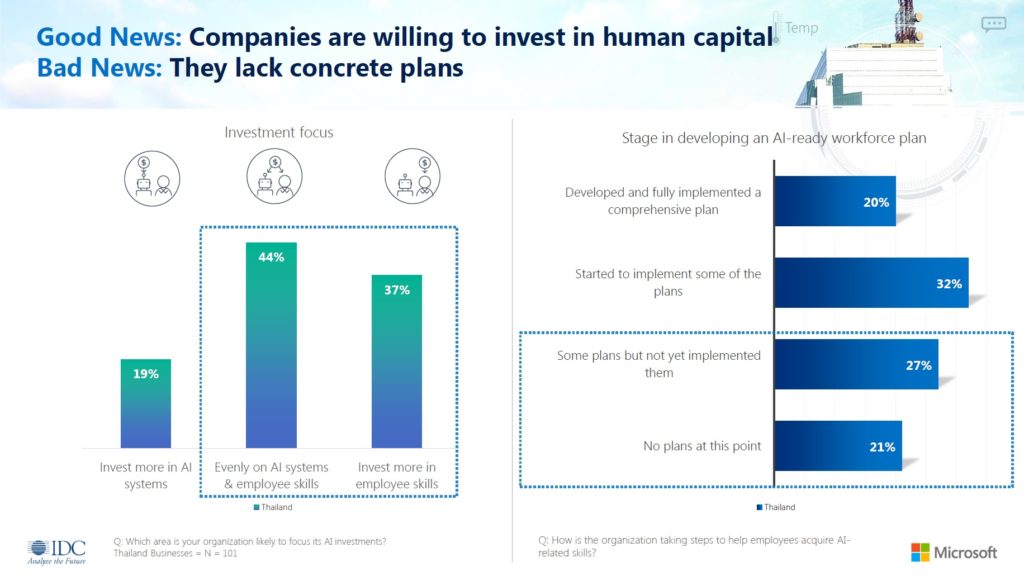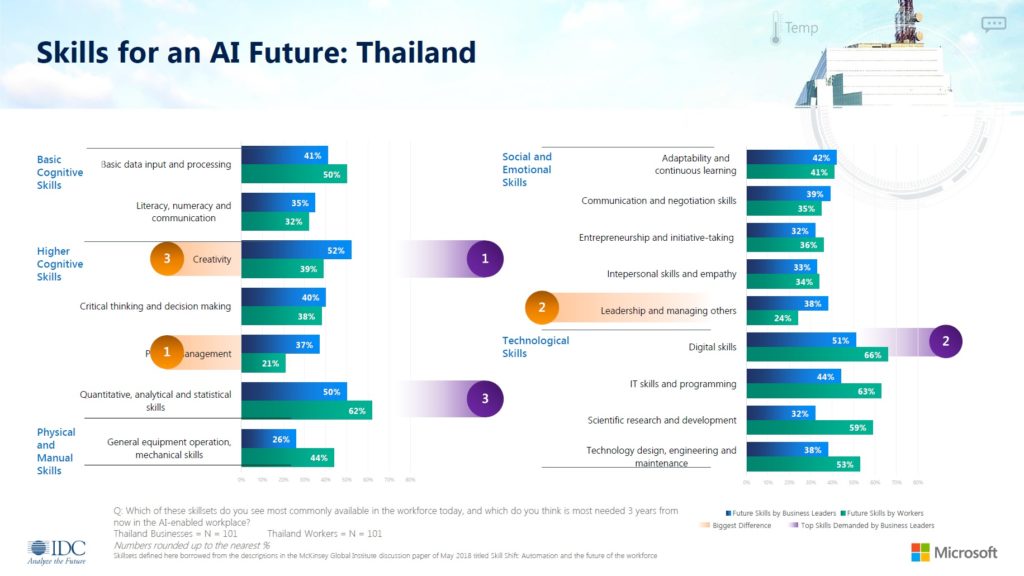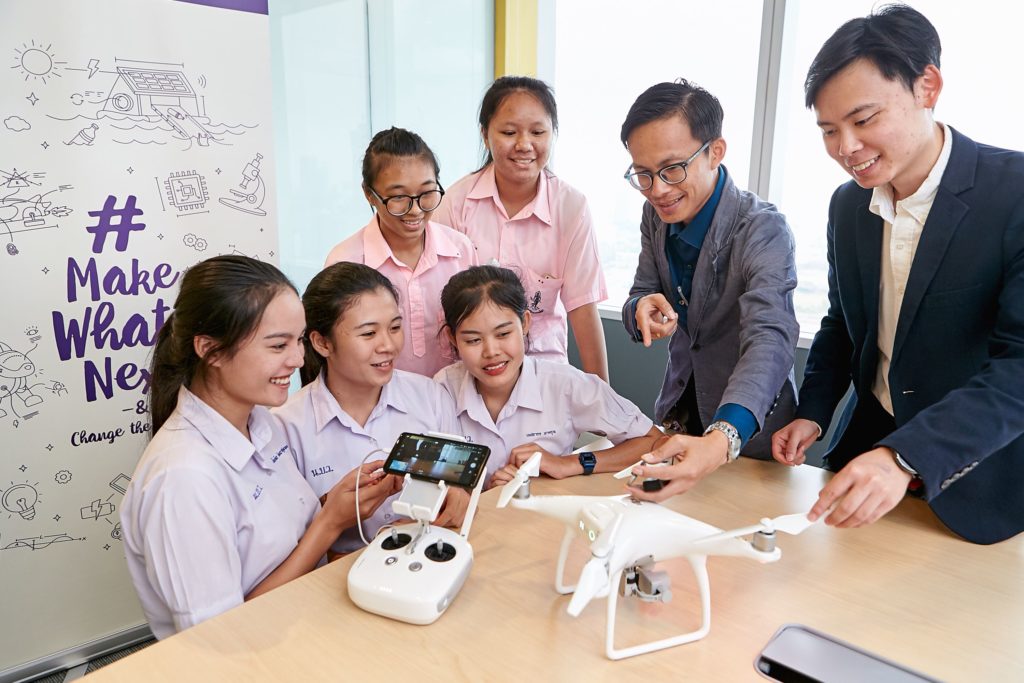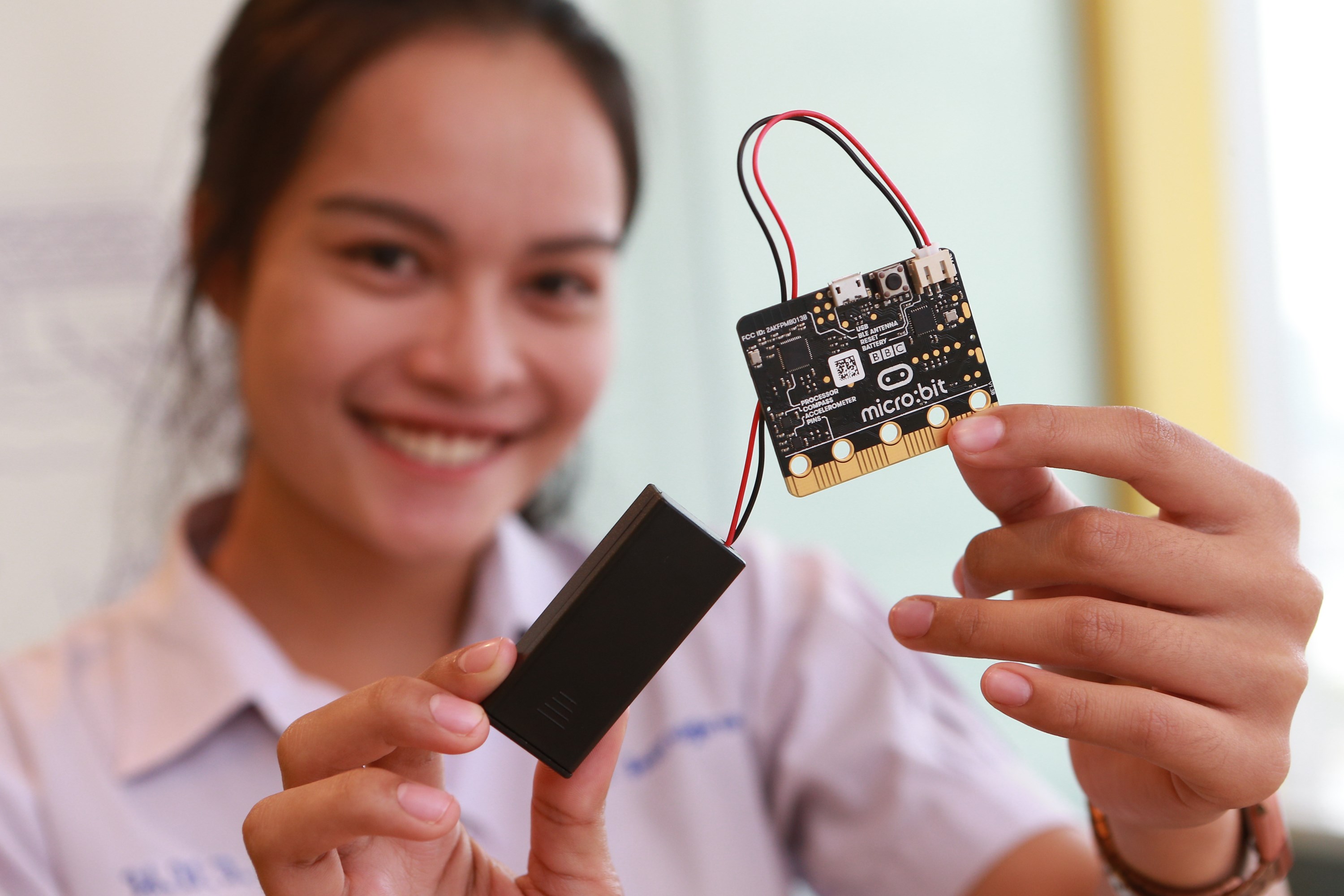- Joint survey with IDC highlights in-demand skills for the workforce of the future
- Only 20% of Thai organizations have fully implemented comprehensive plans to develop their workforce for the AI era
Thailand, 4 April 2019 – Microsoft and IDC’s joint survey of 101 business organizations in Thailand has revealed key gaps in available and in-demand skills across the Thai workforce as the country continues its progress into a future driven by artificial intelligence (AI). The study also shows that almost half of Thai businesses surveyed had yet to carry out any workforce skills development plan to take advantage of the capabilities of AI.
 “AI technology brings with it game-changing capabilities for businesses and consumers alike. In this new and ever-changing world, it is increasingly difficult to think of any job or field that is untouched by technology. Many students today will graduate into a job market full of roles that do not even exist today,” said Dhanawat Suthumpun, Managing Director of Microsoft Thailand. “With many businesses already interested in the potential of AI to drive their capabilities to new heights, it is vital that they also invest in the future of not only technology but also their people in order to create lasting, sustainable change.”
“AI technology brings with it game-changing capabilities for businesses and consumers alike. In this new and ever-changing world, it is increasingly difficult to think of any job or field that is untouched by technology. Many students today will graduate into a job market full of roles that do not even exist today,” said Dhanawat Suthumpun, Managing Director of Microsoft Thailand. “With many businesses already interested in the potential of AI to drive their capabilities to new heights, it is vital that they also invest in the future of not only technology but also their people in order to create lasting, sustainable change.”
The Microsoft-IDC study shows that only 20% of Thai businesses have developed and fully implemented comprehensive plans to develop a truly AI-ready workforce, while 32% have begun partial implementation of their plans. However, 48% of organizations surveyed have yet to take any action in this matter, with 21% having no plans to do so at this point.

Michael Araneta, Associate Vice President of IDC Financial Insights, added: “Fortunately, we also saw strong recognition and relatively widespread recognition of the workforce as an important element for the future of businesses. 77% of Thai businesses surveyed indicated that they would at least invest evenly on employee skills and AI. Companies and their employees are also in agreement over the employer’s central role in reskilling the workforce, with 93% of business leaders and 89% of employees stating that the organization must take the lead in this regard.”
Both sides also share the same perspective when it comes to the future impact of AI on their jobs. 77% of business leaders and 58% of workers expect the technology to empower them to perform better or more efficiently in their roles, while 13% of leaders and 19% of workers foresee the emergence of new, knowledge-based jobs. Only 5% of business leaders and 13% of workers believe that AI will take over jobs previously done by humans.
Key skills in demand for the jobs of tomorrow
Thai business leaders participating in the study named creativity (52%), digital skills (51%), and analytical or statistical skills (50%) as the most valuable skills among employees in the future. They also predict that these three skills as well as the ability to carry out scientific research and development will be in shortage over the next three years.
“Another important data point to note is the gap between the expectations of business leaders and employees in choosing important skills to develop for the future,” added Araneta. “Executives in Thai organizations believe that a strong workforce will need more than just technical skills, with project management (16% difference), leadership and people management (14% difference), and creativity (13% difference) being the three skills with the highest gaps between leadership and employee perspectives on their importance.”

Furthermore, employees also feel more skeptical about their organizations’ cultural readiness for AI adoption. 72% of employees believe they are not empowered to take risks, make decisions, or work with speed and agility, while 45% see a lack of drive from company leadership to proactively innovate.

Dhanawat said, “At Microsoft, we have made skills development a top priority for people of all ages. Through initiatives such as the Hour of Code, #MakeWhatsNext, and the Imagine Cup competition, we are empowering next-generation talent with the right tools and skills to create something special out of technology. Developers looking to get started with AI can also take advantage of free resources available from programs such as the Microsoft AI School. To get ahead in the future, organizations and individuals must look beyond simply making use of technology and aspire to forge their own path to success.”
For more information on Microsoft’s AI platform, visit https://news.microsoft.com/apac/features/artificial-intelligence/.

